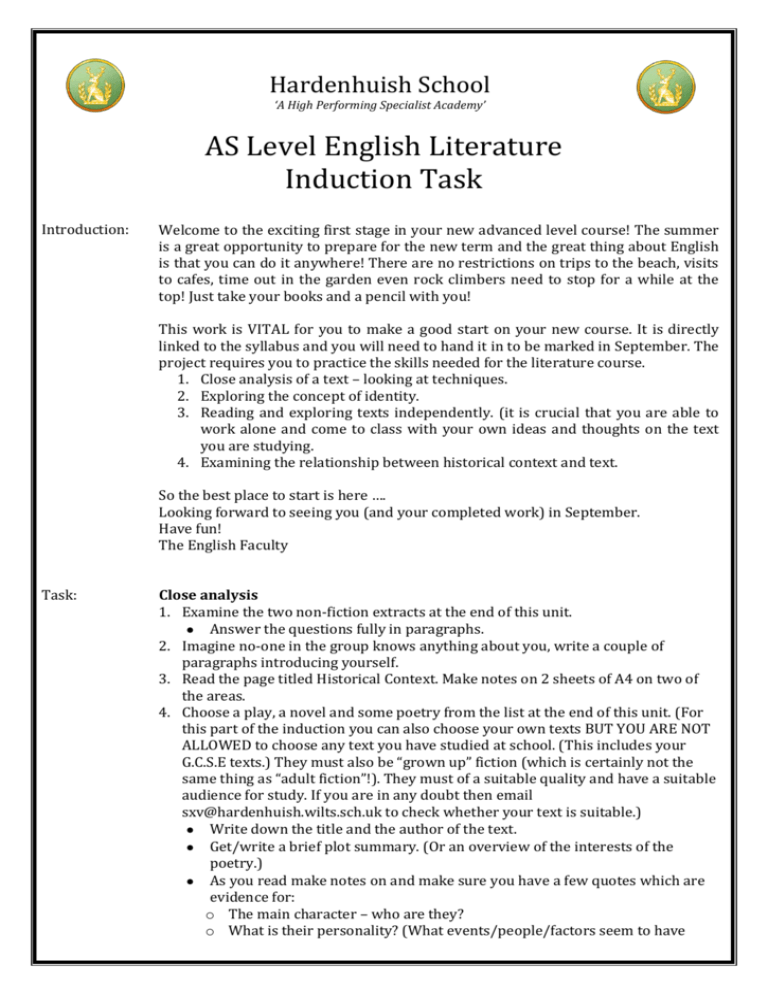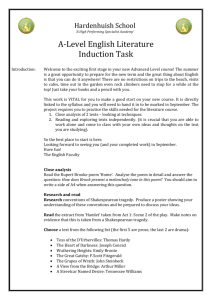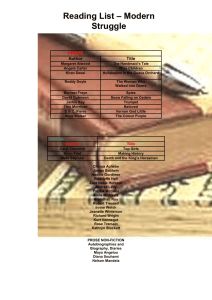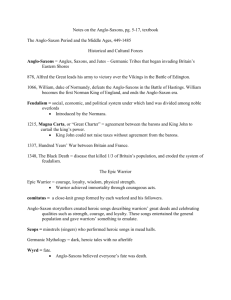AS Level English Literature Induction Task
advertisement

Hardenhuish School ‘A High Performing Specialist Academy’ AS Level English Literature Induction Task Introduction: Welcome to the exciting first stage in your new advanced level course! The summer is a great opportunity to prepare for the new term and the great thing about English is that you can do it anywhere! There are no restrictions on trips to the beach, visits to cafes, time out in the garden even rock climbers need to stop for a while at the top! Just take your books and a pencil with you! This work is VITAL for you to make a good start on your new course. It is directly linked to the syllabus and you will need to hand it in to be marked in September. The project requires you to practice the skills needed for the literature course. 1. Close analysis of a text – looking at techniques. 2. Exploring the concept of identity. 3. Reading and exploring texts independently. (it is crucial that you are able to work alone and come to class with your own ideas and thoughts on the text you are studying. 4. Examining the relationship between historical context and text. So the best place to start is here …. Looking forward to seeing you (and your completed work) in September. Have fun! The English Faculty Task: Close analysis 1. Examine the two non-fiction extracts at the end of this unit. Answer the questions fully in paragraphs. 2. Imagine no-one in the group knows anything about you, write a couple of paragraphs introducing yourself. 3. Read the page titled Historical Context. Make notes on 2 sheets of A4 on two of the areas. 4. Choose a play, a novel and some poetry from the list at the end of this unit. (For this part of the induction you can also choose your own texts BUT YOU ARE NOT ALLOWED to choose any text you have studied at school. (This includes your G.C.S.E texts.) They must also be “grown up” fiction (which is certainly not the same thing as “adult fiction”!). They must of a suitable quality and have a suitable audience for study. If you are in any doubt then email sxv@hardenhuish.wilts.sch.uk to check whether your text is suitable.) Write down the title and the author of the text. Get/write a brief plot summary. (Or an overview of the interests of the poetry.) As you read make notes on and make sure you have a few quotes which are evidence for: o The main character – who are they? o What is their personality? (What events/people/factors seem to have influenced their character?) o What struggles/difficulties do they encounter through the text? o How do they deal with them? How does this reflect their personality? o Do they seem to you to be typical of their historical/social context? If so, in what ways? If not, why not? o Do they or any other character change significantly throughout the course of the text? Explain why. For each of your points for the above you need a quotation. In the quotation identify the “tool” or technique that the text uses. So for example you could say the reader learns this through the description/the use of adjectives,/the stage directions. Alternatively you might say this is reflected in the structure, the repetition of the phrase etc. Additional: All resources are within this document Due: Please bring to your first lesson in September Set by: If you have any queries regarding the task set please contact the Key Stage 5 coordinator sxv@hardenhuish.wilts.sch.uk and we’ll get back to you with an answer as soon as we can. Expected Time Commitment: 10 hours I have a dream – Martin Luther King. Martin Luther King was an American Civil Rights leader in the 1960s. In 1963, he led protests against discriminatory practices in Birmingham, Alabama where the white population was violently resisting desegregation. As attacks against civil rights protestors increased, the city was dubbed “Bombingham” and King was arrested and jailed for his part in the protests. After his release, King participated in the enormous civil rights march on Washington in August 1963 and delivered his famous “I have a dream” speech, predicting a day when the promise of freedom and equality for all would become a reality in America. As we walk, we must make the pledge that we shall always march ahead. We cannot turn back. There are those who are asking devotees of civil rights, ‘When will you be satisfied?’ We can never be satisfied as long as the Negro is the victim of unspeakable horrors of police brutality. We can never be satisfied as long as our bodies, heavy with the fatigues of travel, cannot gain lodging in the motels of the highways and the hotels of the cities. We cannot gain lodging in the motels of the highways and the hotels of the cities. We cannot be satisfied as long as the Negro’s basic mobility is from a smaller ghetto to a larger one. We can never be satisfied as long as our children are stripped of their selfhood and robbed of their dignity by signs stating ‘For Whites Only’. We cannot be satisfied as long as a Negro in Mississippi cannot vote and a Negro in New York believes he has nothing for which to vote. No, no, we are satisfied; and we will not be satisfied until justice rolls down like waters and righteousness like a mighty stream. 1. What is the form of this piece of writing? 2. What is its purpose? 3. Who does the audience seem to be? 4. Summarise (in about two sentences) Luther King’s basic argument. 5. What are the key points Luther King is making about a black people’s struggle for o identity? o Consider: o Patterns of imagery o Commands o How people are labelled o Form and structure o Dramatic and emotive language. o Repetition o Use of the first person. Too Black, Too Strong – Benjamin Zephaniah Best known as a poet, though he has also written novels, plays, articles and music for both adults and children, Benjamin Zephaniah was brought up in the Handsworth district of Birmingham, England. Zephaniah left school at 14 and, after a few difficult teenage years, move to London in 1979 and published his first poetry collection, Pen Rhythm, in 1980. He explores many themes in his work but chief among them area issues of race and, in particular, Britishness. He employs a distinctive poetic style, drawing heavily on Jamaican patois and relishing the rhythms of rap and is a highly acclaimed performer of his own work as well as a social and political commentator. The following passage is taken from the introduction to one of Zephaniah’s collections of poetry, entitled Too Black, Too Strong and published in 2001. Britain is a wonderful place. It is a nation of shopkeepers, aristocrats, farmers and animal lovers, all at the same time. It has the 'mother of all parliaments', its inhabitants enjoy 'free speech' and the right to vote in open elections and it is so confident that it doesn't need a written constitution. Its cities are havens for the young, they pulsate to the music of the world, and though the skies may be grey for much of the year the streets are coloured by its people who now talk about 'raving' just as much as they talk about the weather. The cities 'rock'. The same can be said for many of its towns, they may not have received the title of 'city' from the Crown or be the 'seat of a bishop', but they still have the attitude and the rhythm of the city. Above all the capital city shines magnificent through its pollution, it is amongst the heavyweights of cities, here it is estimated that over three hundred languages are spoken. But Britain is not just a collection of cities. The quaint beauty of the 'Lake District' continues to inspire poets, and the grandeur of the Scottish mountains is famous all over the world. I have always admired the splendour of the Welsh Valleys, it seems to me this area represents both the picturesque and industrial side by side, for it is here that many of the nation's coalmines are to be found. In fact many of those coalmines were closed down in the 1980's and they have now become tourist attractions, and a chosen few coal miners who were once doomed to a life of unemployment are now paid to show you what they used to do. The same fate has fallen upon coalmines all over Britain. But Britain is not just a collection of unused coalmines or museums, what of British culture? Well to date Britain has 21% of all major Oscars, 13% of television programmes shown at peak times worldwide are made in Britain, our pop music keeps conquering America, everyone knows of William Shakespeare and the Bronte Sisters, but what of the Teletubbies? Well they are one of the biggest single export products ever. All of the above represent an idea of Britain; we pick what we want to represent us depending on what type of 'subject' we are. The title of British means many things to many people, some choose to remain forever nostalgic for its 'days of former greatness' when Shakespeare was 'Top of The Pops' and the sun never set on the empire, whilst for others it's about the melting pot, bursting with vitality and smiling multiculturalism. The latter will tell you that it is the great British Indian curry that binds us together, these people are out to carve out a new idea of Britishness and feel hindered by those whose only purpose is to preserve the past. We are all imagining Britain, but that's a luxury, what's the reality? It is a place where African-Caribbean women make up 14% of the female prison population, whereas African-Caribbean people as a whole only make up 1.3% of the population of Britain. African-Caribbean and Asian people together make up 5.6% of the population but 16% of the prison population. Anybody who knows anything about Britain knows that you are five times more likely to be stopped and searched by the police if you are African-Caribbean, it also worth knowing that over 130,000 racist attacks happened in the Year 2000. These figures weren't given to me by friends and family, these are official figures, government figures, the Commission for Racial Equality figures, and anybody who knows anything about official figures will also know they usually fall very short of the mark. Many of us Brits are easily deceived: even I used to believe that the country was becoming overcrowded and that the reason why so many Asians open corner shops is because they don't have the education to do anything else. The truth is that in the Year 2000, 11,000 more people left Britain than entered, over half the people given work permits were from 'The United States of America' and one out of every five Asian shopkeepers has a university degree, when asked almost every one of them said they opened up their own business because of racial discrimination by employers. What refugees? From being totally uninhabited Britain has constantly taken in new visitors be they Picts, Celts, Angles, Saxons, Chinese, Jamaicans, Jutes, Huguenots. All of them, with the possible exception of the Romans can be classed as refugees of one type or another. Some were fleeing religious persecution, others political persecution or racial persecution, some were even fleeing persecution from the weather e.g. hurricanes and floods, but we all came here from somewhere. So in theory Britain should be the last place on earth where you should find racism. But the reality is that many people are suffering from what I call the 'last of the boat syndrome'. They conveniently forget their journey here and now live in the fear that Britain will be flooded by penniless asylum seekers who would then drain our precious society of everything they hold dear. The reality is 30% of refugees have left professional jobs, 10% held managerial positions and only around 5% are unskilled. The reality is that refugees built the National Health Service, refugees built our roads, they clean our cars, and when given the chance new refugees contribute disproportionately to the economy because they have seen hardship and suffering and view economic success as a way of repaying their country of refuge. Note down the key points Zephaniah is making here about the struggle for identity and comment on some of the ways he is expressing these points. You should consider: a. How the form and structure if the passage helps to contribute to the meaning. (So think about whether it reads like an essay, a rant or an argument and the organisation of the piece too.) b. The tone of the extract and comment on the language the writer uses and the references he makes. Historical Context The A/S course focuses on texts written between 1900 and the present day. The main areas which relate to our study are: Class Politics Gender - Homosexuality & Women Race Religion We need to have an overview of how the representation, view and treatment of these different groups/ideas in society has changed since 1900. Clearly in 1910 the idea of having a female or black President in the U.S. was clearly unthinkable. Likewise the concepts of multi-culturalism or gay rights are equally novel. Obviously whole books have been written on all of these …. but for each area we only need about a side of A4 in note form which should give an overview of/a sense of the situation in the past and now. (The purpose of this is for you to think about important issues and concepts which are fundamental to the course. ) Consider: A sense of trends/changes Any key moments. (e.g. when the treatment of a particular group changed as when women got the vote or when homosexuality was de-criminalised). Any texts (novels, plays, films etc) which deal with the subject. e.g. My Fair Lady is concerned with class division. Choose 2 of the areas to research and prepare some notes on. Use the questions as a starting point but don’t feel restricted or contained by them. Gender – Women. 1. In the early part of the twentieth century – what was the status of women? How were they treated by men, their families, the rest of society? 2. What were the “battles” have women fought over the last century? What, in general terms was their purpose? What were their goals? 3. Consider your perception of the current situation? How have attitudes to women changed? How do women think about themselves? Does society treat women and men differently? Homosexuality 1. In 1900 how, in general terms, was homosexuality treated by society? Give examples of evidence to prove your views. 2. When did homosexuality between men stop being a criminal offence? 3. What “battles” have supporters of homosexuality fought? What means have they used to try and raise awareness of their cause? 4. What is your perception of the current situation? How is homosexuality treated by society generally or particular sections of society? Is there a difference in attitude towards male and female homosexuality? Class 1. What does the term class mean? 2. How would you roughly divide British society in class terms? 3. How would you stereotypically identify the different classes? 4. What advantages does the upper class have? 5. In 1900, how was the importance of class different to how it is now? In what ways was this evident? Religion 1. In 1900 what was the predominant religion in the U.K? 2. How important was religion to the individual at the turn of the century? How could you prove this? 3. How has the “religious profile” of the U.K. changed over the last century? 4. What national and international conflicts have had a religious element to them? 5. What ideological conflicts has the Church of England undergone over the last century? E.g female vicars etc. 6. What do you consider are the religious issues of our time? Text List - The Struggle for Identity in Modern Literature (* denotes text published after 1990) (+ denotes text published between 1800-1945) PROSE FICTION Any of the ten named prose texts for Unit 2, or any other novel by Morrison. Chinua Achebe James Baldwin Nadine Gordimer Radclyffe Hall Zora Neale Hurston Andrea Levy Patrick McCabe Anne Michaels Arundhati Roy Robert Tressell Irvine Welsh Jeanette Winterson Richard Wright Kurt Vonnegut Rose Tremain Kathryn Stockett Things Fall Apart (Penguin, 1958) Go Tell it on the Mountain (Penguin) July’s People (Bloomsbury, 1981) The Well of Loneliness + (Virago, 1928) Their Eyes Were Watching God + (Virago, 1937) Small Island * (Headline, 2004) Breakfast on Pluto * (Picador, 1998) Fugitive Pieces * (Bloomsbury, 1996) The God of Small Things * (Harper Perennial, 1997) The Ragged-Trousered Philanthropists + (Flamingo, 1914) Trainspotting * (Vintage, 1993) Oranges are not the only fruit (Vintage, 1984) Native Son + (Vintage, 1940) Slaughterhouse 5 (Vintage, 1969) The Road Home (Chatto and Windus) The Help (Penguin, 2009) PROSE NON-FICTION Autobiographies and Biography, Diaries Maya Angelou Autobiography, especially I Know Why The Caged Bird Sings (Virago, 1969) Diana Souhami The Trials of Radclyffe Hall * (Virago, 1999) Nelson Mandela Long Walk to Freedom (Abacus, 1994) Memoirs and Interviews Silvia Calamati Bobby Sands Malcolm X Alice Walker Women’s stories from the North of Ireland * (Beyond the Pale Publications, 2002) Skylark Sing Your Lonely Song (Mercier Press, 1982) Malcolm X Talks to Young People (Pathfinder, 1964-1965) The Same River Twice: Honoring the Difficult * (Phoenix, 1996) Travelogues Salman Rushdie The Jaguar Smile: A Nicaraguan Journey (Vintage, 1987) History and cultural commentary, essays and speeches David Beresford Ten Men Dead: The Story of the 1981 Irish Hunger Strike (Harper Collins,1987) Beverley Bryan, Suzanne Scafe, The Heart of the Race (Virago, 1985) Stella Dadzie Germaine Greer The Female Eunuch (Harper Perennial, 1970) Martin Luther King Jr. I Have A Dream: Writings And Speeches That Changed The World (Harper, 1956-68) Adhaf Soueif Mezzaterra-Fragments from the Common Ground * (Bloomsbury, 2004) Amrit Wilson Dreams, Questions, Struggles South Asian Women in Britain (Pluto Press, 2006) Laws Parliament ‘Section 28 of the Education Act’ 1988 Literary Criticism Ralph Ellison Dolly A. McPherson Kate Millet Amrit Wilson Richard Wright Jeremy Hawthorn ed. Shadow and Act (Vintage, 1967) Order out of Chaos: The Autobiographical Works of Maya Angelou (Virago, 1990) Sexual Politics (Virago, 1977) Finding a Voice: Asian Women in Britain (Virago, 1978) Blueprint for Negro Writing + (1937) The British Working Class Novel in the Twentieth Century (Hodder Arnold, 1984) DRAMA Brendan Behan Sudhar Bhuchar The Hostage (Methuen, 1958) Child of the Divide * (Methuen Modern Plays) Jim Cartwright Caryl Churchill Claire Dowie Brian Friel Lorraine Hansberry Sarah Kane Tony Kushner Martin McDonagh Sean O’Casey Arthur Miller Mark Ravenhill Ntozake Shange Timberlake Wertenbaker Tennessee Williams International Connections (contributor Jackie Kay) POETRY Simon Armitage W.H Auden Gillian Clarke Carol Ann Duffy Allan Ginsberg Langston Hughes Jackie Kay Liz Lockhead Audre Lorde Grace Nichols Adrienne Rich Lemn Sissay Gertrude Stein Alice Walker Benjamin Zephaniah Edited by Lemn Sissay Agnes Meadows Gillian Clarke Alice Oswald Grace Nichols Carol Ann Duffy Jackie Kay Liz Lochhead Lenin Sissay Road (Methuen Modern Plays, 1986) All plays * (some will be post 1990) Why is John Lennon Wearing a Skirt? * (Methuen Modern Plays, 1996) Dancing at Lughnasa * (Faber, 1990) A Raisin in the Sun (Methuen Modern Plays, 1959) Complete Plays * (Methuen Drama, 1998-2006) Angels in America * (Nick Herne Books, 1992) Beauty Queen of Leenane * (Methuen, 1996) Three Dublin Plays: Juno and the Paycock + (1924), The Plough and the Stars + (1926), Shadow of a Gunman + (1923) (Faber) Death of a Salesman (Penguin, 1949) Citizenship * (Methuen Modern Plays, 2006) Shange Plays 1- (Includes For Colored Girls Who Have Considered Suicide When the Rainbow is Enough) Our Country’s Good (Methuen, 1988) A Streetcar Named Desire (Methuen, 1947) New Plays for Young People * (Faber 2003) Dead Sea Poems * (Faber, 1995) e.g ‘The Quarry’, ‘Funeral Blues’, ‘Refugee Blues’ + (1930s) Letter From a Far Country (1985) The Other Country * (Anvil, 1990) Howl (City Lights Pocket Poet Series, 1956) Collected Poems + (Vintage, 1930-1960) Life Mask * (Bloodaxe Books, 2005) Dreaming Frankenstein and Collected Poems (Polygon, 1984) Any – (some will be post 1990) The Fat Black Woman’s Poems (Virago, 1984) The School Among the Ruins * (Norton, 2004) Morning Breaks in the Elevator * (Payback Press, 1999) Tender Buttons + (Dover, 1914) Revolutionary Petunias and other Poems (Harcourt Brae Jovanovitch, 1970) Too Black, Too Strong * (Bloodaxe Books, 2001) The Fire People: A Collection of Contemporary Black British Poets * (Payback Press, 1998) Woman (Waterways, 2003) A Recipe for Water (Carcaret, 2009) The Thing in the Gap Stone Stile (Faber, 1996) I Have Crossed an Ocean (Bloodaxe Books Ltd, 2010) Love Poems (Picador, 2010) Darling (Bloodaxe Books Ltd, 2007) The Colour of Black and White (Polyfon, 2003) Rebel Without Applause (Bloodaxe Books Ltd, 1992 TEXTS IN TRANSLATION Novels Isabel Allende Alexandra Kollontai Manuel Puig Alexander Solzenichen The House of the Spirits (Chile/Spanish) (Black Swan, 1985) Love of Worker Bees + (USSR/Russian) (Virago, 1930) Kiss of the Spider Woman (Argentina/Spanish) (Vintage, 1976) One Day in the Life of Ivan Denisovitch (USSR/Russian) (Penguin, 1962) Poetry Pablo Neruda Residence on Earth + (Chile/Spanish) (Souvenir Press, 1933) Drama Bertolt Brecht Federico Garcia Lorca Mother Courage and her Children + (German) (Methuen, 1940) The House of Bernarda Alba + (1936), Yerma + (1934), Blood Wedding + (1933) (Spanish) (Penguin) Non fiction autobiography/diary/travelogue Anne Frank The Diary of a Young Girl (Dutch) (Penguin, 1947) Che Guevara The Motorcycle Diaries (Argentina/Spanish) (Harper Perennial, 1952) Nawal al-Saadawi Memoirs from the Women’s Prison (Egypt/Arabic) (1984)








